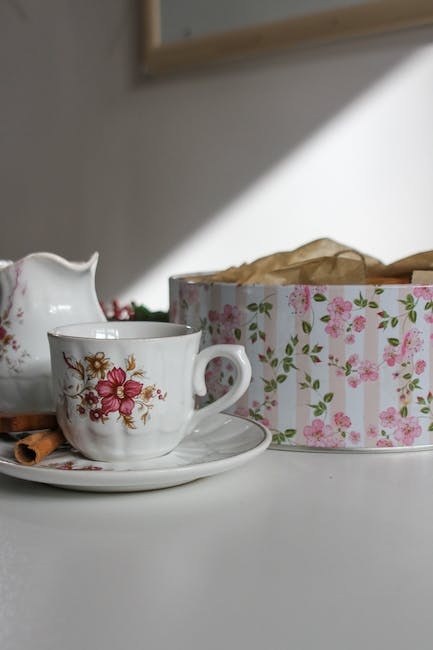Discovering the Benefits of Rooibos Tea
For tea lovers around the world, there is a new type of tea that has been gaining popularity in recent years – Rooibos tea. This herbal tea, which is made from the leaves of the Aspalathus linearis plant, has gained a reputation for its unique taste and numerous health benefits.
Origins of Rooibos Tea
The Aspalathus linearis plant is native to South Africa and is commonly known as red bush, which is where the tea gets its name. For centuries, the indigenous people of South Africa have been using the leaves of this plant to create a herbal tea that is rich in flavor and nutrition.
Taste and Flavor Profile
Rooibos tea has a naturally sweet and nutty flavor, with hints of caramel and vanilla. It is often compared to black tea or oolong tea in terms of taste, but without the caffeine content. This makes it a popular choice for those who want to avoid or limit their caffeine intake.
Health Benefits of Rooibos Tea
Rooibos tea is not only delicious, but it also comes with a host of potential health benefits. Here are some of the most significant benefits:
- Antioxidant Properties: Rooibos tea is rich in antioxidants, specifically aspalathin and nothofagin, which are believed to have anti-inflammatory and anti-cancer properties.
- Reduces Blood Pressure and Cholesterol Levels: Some studies have suggested that rooibos tea may help lower blood pressure and cholesterol levels, which can reduce the risk of heart disease.
- Improves Bone Health: Rooibos tea contains minerals such as calcium, manganese, and fluoride, which are essential for maintaining healthy bones.
- Boosts Immune System: Rooibos tea is also believed to have immune-boosting properties, helping to fight off infections and diseases.
- Natural Remedy for Ailments: In addition to its potential health benefits, rooibos tea is also commonly used as a natural remedy for various ailments, including allergies, digestive issues, and skin conditions.
How to Brew Rooibos Tea
Brewing rooibos tea is simple and can be done in just a few steps:
- Boil water and let it cool for a few minutes (the ideal temperature for brewing rooibos tea is 203F or 95C).
- Add 1-2 teaspoons of rooibos tea leaves to a teapot or tea infuser.
- Pour the hot water over the tea leaves and let it steep for 5-7 minutes.
- Strain the tea leaves and enjoy your delicious cup of rooibos tea.
Conclusion
Overall, rooibos tea is a delicious and healthy alternative to traditional black tea or coffee. With its unique flavor and numerous health benefits, it’s no wonder that rooibos tea has become a popular choice for tea lovers around the world.
The Surprising Truth About Rooibos Tea Allergies
For many people, a cup of tea is a comforting and relaxing ritual. However, for some, drinking certain types of tea can lead to an unexpected and potentially dangerous allergic reaction. One such tea is Rooibos tea, a popular herbal tea from South Africa. While Rooibos tea allergy is rare, it can happen to some individuals. In this blog post, we’ll explore what causes this allergy, the symptoms to look out for, and how to manage it.
What Causes Rooibos Tea Allergy?
The proteins found in Rooibos tea can trigger an immune response in some individuals, leading to an allergic reaction. These proteins are similar to those found in other plants, such as birch pollen or nuts, which can cause cross-reactivity and allergies in susceptible people. This means that if you have a known allergy to birch pollen or nuts, you may be at a higher risk of developing an allergy to Rooibos tea.
Symptoms of Rooibos Tea Allergy
The symptoms of Rooibos tea allergy can vary from mild to severe, and may include:
- Itching
- Swelling
- Hives
- Difficulty breathing
In severe cases, anaphylaxis can occur, which is a life-threatening allergic reaction that requires immediate medical attention. Symptoms of anaphylaxis may include:
- Difficulty breathing or wheezing
- Swelling of the face, lips, tongue, or throat
- Rapid or weak pulse
- Fainting or dizziness
Managing Rooibos Tea Allergy
If you suspect that you have an allergy to Rooibos tea, it’s important to avoid consuming it. In some cases, you may need to carry an epinephrine auto-injector in case of accidental exposure. If you experience symptoms of anaphylaxis, seek immediate medical attention.
If you’re a tea lover but have a known allergy to Rooibos tea, don’t worry. There are plenty of other delicious and safe tea options available. You might try green tea, black tea, or herbal teas like chamomile or peppermint.

Conclusion
While Rooibos tea allergy is rare, it can be a serious condition for those who are affected. By understanding the causes and symptoms of this allergy, you can take steps to avoid it and stay safe. As always, if you experience any symptoms of an allergic reaction, seek medical attention immediately. And remember, there are many other tea options available that are just as delicious and safe.
Is Rooibos Tea Safe for Everyone to Drink?
For tea lovers who are looking for a caffeine-free alternative, Rooibos tea is a popular choice. This South African herbal tea is known for its sweet and nutty flavor, as well as its numerous health benefits. However, while Rooibos tea is generally considered safe for most people to consume, there are some potential allergens that may cause an allergic reaction in certain individuals.
What Makes Rooibos Tea Safe to Drink?
Rooibos tea is naturally caffeine-free and low in tannins, making it a great alternative to other types of tea that may cause jitters or digestive issues. Additionally, Rooibos tea is packed with antioxidants and other beneficial compounds that can help boost your immune system, support heart health, and reduce inflammation.
What Are the Potential Allergens in Rooibos Tea?
According to a study published in the Journal of Allergy and Clinical Immunology, the most common allergens found in Rooibos tea are related to the legume family, such as peanuts, soybeans, and green beans. This is because Rooibos tea is made from the leaves and stems of the Aspalathus linearis plant, which is closely related to legumes.
In addition to legume allergens, there may also be other potential allergens present in Rooibos tea, such as pollen, dust, and mold spores that may be present during the harvesting and processing of the tea leaves. This can be especially problematic for individuals who are highly sensitive to environmental allergens.
Who Should Be Cautious When Drinking Rooibos Tea?
While allergic reactions to Rooibos tea are rare, individuals who have a pre-existing allergy to certain plant or food allergens should be cautious when consuming Rooibos tea. This includes people with a peanut or soy allergy, as well as those with a history of allergies or asthma.
If you are unsure whether Rooibos tea is safe for you to drink, it’s always a good idea to consult with your healthcare provider before trying it. They can help you determine whether Rooibos tea is a good fit for your dietary needs and make recommendations on other types of tea that may be better suited for you.
What Are the Symptoms of an Allergic Reaction to Rooibos Tea?
If you experience an allergic reaction to Rooibos tea, it’s important to seek medical attention immediately. Symptoms of an allergic reaction may include:
- Hives or rash
- Swelling of the face, lips, or tongue
- Difficulty breathing or shortness of breath
- Anaphylaxis (a severe, potentially life-threatening reaction)
It’s important to note that while allergic reactions to Rooibos tea are rare, they can be serious and should be treated as a medical emergency.
The Bottom Line
Rooibos tea is generally considered safe for most people to consume, but individuals with a pre-existing allergy to certain plant or food allergens should be cautious when drinking it. If you experience an allergic reaction to Rooibos tea, seek medical attention immediately. As always, it’s important to consult with your healthcare provider before making any changes to your diet or lifestyle.
Rooibos Tea Allergy: What You Need to Know
For many tea lovers, Rooibos tea is a popular choice for its delicious taste and health benefits. However, like any other food or beverage, some individuals may experience an allergic reaction to Rooibos tea. In this blog post, we’ll explore what a Rooibos tea allergy is, how to manage it, and alternative tea options that you can try.
What is a Rooibos Tea Allergy?
Rooibos tea allergy is rare, but it can happen to some individuals who are sensitive to certain compounds present in the tea. The allergy is usually mild and manifests as skin rashes, itching, and hives, but in rare cases, it can cause anaphylaxis, a severe and potentially life-threatening reaction.
What to Do If You Suspect a Rooibos Tea Allergy?
If you suspect that you have a Rooibos tea allergy, it’s important to stop consuming the tea and seek medical advice. A doctor can perform an allergy test to confirm the diagnosis and prescribe appropriate treatment or medication to manage the symptoms.
Managing Mild Rooibos Tea Allergy
If you have a mild Rooibos tea allergy, you may be able to prevent or reduce the symptoms by avoiding products that contain Rooibos tea or by drinking it in moderation. You can also try brewing the tea for a shorter time or using cooler water to lessen its potency.
Alternative Tea Options
If you still want to enjoy a hot beverage without risking an allergic reaction, there are many alternative tea options that you can try, such as herbal teas, green teas, black teas, or fruit teas. It’s important to read the labels carefully to ensure that the tea does not contain Rooibos or any other ingredients that you may be allergic to.
Some people may also benefit from drinking tea made from rooibos tea substitutes, such as honeybush tea or red bush tea. These teas are similar in taste and appearance to Rooibos but do not contain the same compounds that can trigger an allergic reaction.
Conclusion
Finally, it’s important to remember that Rooibos tea allergy is rare and does not affect everyone. If you have never experienced any adverse reactions to Rooibos tea before, there’s no need to worry or avoid it altogether. However, if you do develop any symptoms after consuming Rooibos tea, it’s important to seek medical advice and take appropriate measures to manage the allergy.
Remember, tea is supposed to be enjoyed, and it’s always better to be safe than sorry. So, if you have any doubts or concerns about Rooibos tea or any other food or beverage, consult your doctor or allergist to get a proper diagnosis and treatment plan.


Leave a Reply